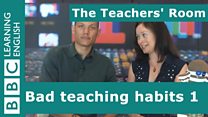Unit 24: English You Need
Exams, news, pronunciation, teachers' tips, learners' questions
Select a unit
- 1 English You Need
- 2 English You Need
- 3 English You Need
- 4 English You Need
- 5 English You Need
- 6 English You Need
- 7 English You Need
- 8 English You Need
- 9 English You Need
- 10 English You Need
- 11 English You Need
- 12 English You Need
- 13 English You Need
- 14 English You Need
- 15 English You Need
- 16 English You Need
- 17 English You Need
- 18 English You Need
- 19 English You Need
- 20 English You Need
- 21 English You Need
- 22 English You Need
- 23 English You Need
- 24 English You Need
- 25 English You Need
- 26 English You Need
- 27 English You Need
- 28 English You Need
- 29 English You Need
- 30 English You Need
Session 4
Welcome to The Teachers’ Room. The show all about teaching practice. Grab a cup of coffee, pull up an armchair and relax. Learn something new, remember something fundamental or just have a giggle.
Activity 1
The Teachers' Room
Bad habits 2
Dan and Sian talk about three more bad habits that many teachers may have.
Watch the video and complete the activity

___________________________________________________________________
Did you like that? Why not try these?
____________________________________________________________________________________
Bad teaching habits 2
No teacher is perfect and all teachers have bad habits. Being a good teacher means reflecting on these and trying to reduce them as much as possible.
Completing a student’s sentence
In order to learn better, students require a level of challenge. This means that they are required to think in order to complete their tasks and this thinking is what consolidates learning. If a teacher completes a student’s sentences, especially in the places that the student is having the most trouble, they remove the need for the student to think about how to overcome their communication problem, which means they are less likely to learn whatever they are having difficulty with.
The board
First, don’t talk to the board, talk to the students. If you need to write on the board, do so first and then address the students, or find a way to write so that you are still facing them. Not only is talking to the board kind of rude, since you have your back to whoever you are speaking to, but it makes miscommunication more likely since your words will be distorted.
Secondly, think about your board layout and hand writing in your planning stage. A visually confusing board is very demotivating to try and read. Make things easy for your students with clear spaces and colours, not overcrowding things and trying to keep your hand-writing clear and easy to read.
Not checking understanding properly
You can never assume that learning has been achieved. The only way to know for sure is to test it. Many students will stay quiet when asked if they understand for fear of looking stupid, or will say yes, even if they don’t, or may do so because they believe they do. A teacher should never ask ‘Do you understand?’ because the answer is unreliable. Teachers use CCQs (Concept checking questions) and ICQs (Instruction checking questions) to establish that what the students have understood is correct.
To do
Try our quiz to see if you've picked up our tips.
The Teachers' Room Quiz
3 Questions
Check what you've learned by selecting the correct answer to each question.
Help
Activity
Check what you've learned by selecting the correct answer to each question.
Hint
If a student is being challenged they are more likely to remember the lesson they are learningQuestion 1 of 3
Help
Activity
Check what you've learned by selecting the correct answer to each question.
Hint
This is something that should be considered when deciding how to implement the lessonQuestion 2 of 3
Help
Activity
Check what you've learned by selecting the correct answer to each question.
Hint
What is the student likely to say?Question 3 of 3
Excellent! Great job! Bad luck! You scored:
Get involved
Well, those were just a few ideas that we here at BBC Learning English had, but we know that you teachers out there have lots of fantastic ideas too, and we’d like you to share them with us and everybody else.
Here is a great tip sent in from Nina who is a teacher in Russia:
Guess the quote:Split students into pairs. Give one pair an interesting quotation and the other a blank sheet of paper with a number of gaps equal to the quote. Student B asks student A to describe or explain the words in the quotation. After, the quotation can be used for a class discussion.
If you have a great tip or technique for good or bad teaching habits, or anything else, please email us at learningenglish@bbc.co.uk. Your email could be posted here on this page, or may even be mentioned in our show.
We are also looking for video tips to include in the programme. You could be rewarded with a T-shirt for your efforts.
End of Session 4
Next up is Learners' Questions. What will this week's Learner Question be? Whatever it is, Dan's here with the answer! Join us in Session 5 to find out.
Session Vocabulary
Bad teaching habits 2
- Completing a student's sentences
- Talking to the board
- Not checking a student's understanding properly


